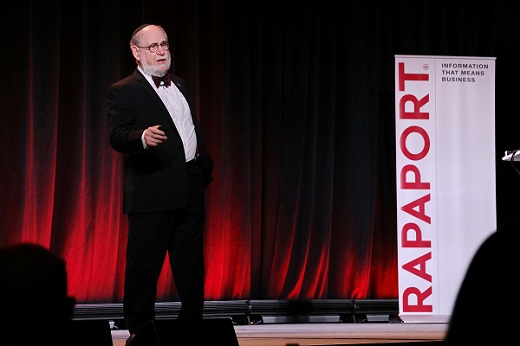|
|
Breakfast of Champions
The state of the diamond industry, the lessons of the pandemic, and the need to end atrocities at Marange were among the topics at Rapaport’s Las Vegas events.
Oct 7, 2021 9:24 AM
By Avi Krawitz
|
|
|

RAPAPORT... Slowly but surely, the diamond and jewelry industry is moving away from Zoom calls and back to live interactions — at least partially. This year’s JCK Las Vegas show featured a series of events that combined in-person attendance with online participation to accommodate varying approaches to the still rampant coronavirus.
Among those adopting the hybrid model was the Rapaport Group, which hosted its annual Las Vegas breakfast and the Rapaport Social Responsibility Conference. The breakfast featured Chairman Martin Rapaport’s “State of the Diamond Industry” address, as well as virtual presentations by Signet Jewelers CEO Virginia Drosos and Zimbabwean civil society activist Farai Maguwu.
Here are some of the key points from those presentations.
Martin Rapaport outlines the big issues
● Strong new realities are developing due to a combination of forces, including Covid-19, the influence of progressives in Congress, the distribution of stimulus checks, and the concepts of diversification and inclusiveness in business — be it along racial or gender lines.
● As long as the government keeps pushing money out, jewelry is going to do well, but there are going to be some long-term problems, such as inflation, that are important to watch for.
● In the wake of Covid-19, people are looking for emotional and financial security — two elements that diamonds can provide.
● Technology has become a key component in every aspect of our lives. When buying and selling jewelry, we need to be extra personal to differentiate ourselves from big machines that use artificial intelligence to drive digital marketing. We need to combine digitalization and virtual personalization.
● Disintermediation is occurring in the industry, meaning that the middleman is being cut out. This weeds out small jewelers, brokers and others who can’t compete in today’s digital environment. We all have to define our unique selling propositions and focus not just on what we sell, but how we sell.
● In the current digital environment, those with extensive diamond and jewelry expertise, as well as technological expertise, will inherit the industry.
● There are a lot of good things happening when it comes to social responsibility. Among the factors driving those developments are banks’ anti-money laundering requirements, brands’ desire to protect themselves, and consumers’ demand for ethical products. It’s not a simple fix, but product-centric social responsibility, or supply-chain social responsibility, is going to become the norm.
What Signet learned from Covid-19
As the largest specialty jeweler in the US, Signet Jewelers serves as a bellwether of US demand and often sets the tone for strategic thinking within the industry. After Covid-19 forced the company to close its 2,800 stores across the US, Canada and the UK, Signet chose to take a proactive position.
The jeweler recognized that it needed to turn the crisis into a game changer, not just for the short term, but for sustainable long-term growth, Drosos said via video conference at the breakfast.
She shared three main lessons the company had learned from the pandemic:
1. Articulating Signet’s purpose of inspiring love has helped the company stay focused. That sense of purpose has resonated with employees; Signet recently received Great Place to Work certification, with over 75% of its staff providing positive feedback, according to the workplace standards group. The jeweler has also adopted 44 sustainability goals, aiming to improve the world by focusing on people, planet and product.
2. The power of data and analytics has enabled Signet to understand its clients and their preferences better. The numbers indicate that the entire industry has become more relevant in the Covid-19 era, as “customers are expressing love even more.”
3. Consumers value convenience more than they did pre-pandemic. Consequently, the industry needs to consider how it is delivering that convenience to existing and new customers.
Zimbabwe human rights on the line
Maguwu, director at the Zimbabwe-based Center for Natural Resource Governance, appealed to dealers and jewelers to safeguard the human rights of communities that continue to suffer hardships around the country’s Marange diamond fields.
While many are aware of the infamous government takeover of Marange in November 2008, in which more than 200 artisanal miners were reportedly killed, many atrocities have taken place since then, Maguwu stated at the breakfast.
“Many more died in the intervening years, as more and more people are driven by poverty and unemployment into the diamond area,” he said. “The private security guards who are employed to protect the diamond fields, they use torture as a method to deter artisanal miners from coming.”
While these occurrences would ordinarily be domestic issues, they have become an international concern due to the diamond product at the center of it all. Despite the abuses in the area, these diamonds are certified by the Kimberley Process (KP) — a strong argument for including human rights violations in the KP charter, as the World Diamond Council (WDC) has sought to do, he stressed.
Watch the full presentation here: info.rapaport.com/jck21
Image: Martin Rapaport speaks at the Rapaport Breakfast in Las Vegas in August 2021. (Rapaport News)
|
|
|
|
|
|
|
|
|
|
Tags:
Avi Krawitz, diamonds, Farai Maguwu, JCK Las Vegas, Jewelry, Martin Rapaport, Rapaport, Signet Jewelers, Virginia Drosos, Zimbabwe
|
|
|
|
|
|
|
|
|
|
|

|
|